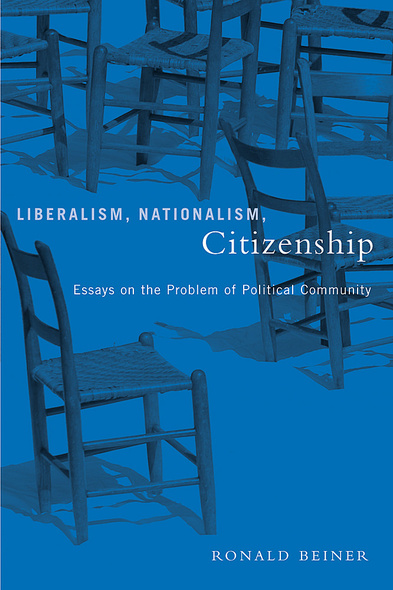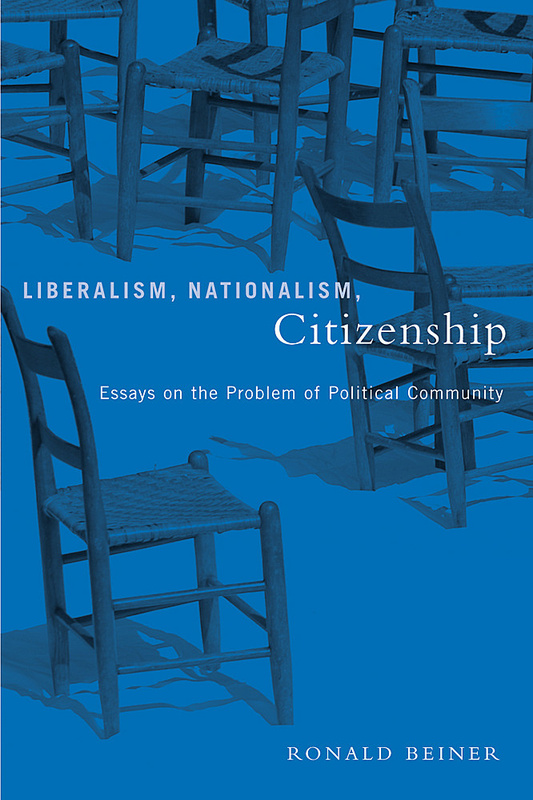
Liberalism, Nationalism, Citizenship
Essays on the Problem of Political Community
Liberals believe that the purpose of politics is to guarantee that individuals do not face unfair impediments in pursuing the lives they choose for themselves. Nationalists believe that the purpose of politics is to ensure that a people’s sense of authentic nationhood wins full expression in powers of collective sovereignty or self-rule. Both of these forms of political commitment yield world-transforming political philosophies, but do either of these visions do adequate justice to a philosophically robust ideal of shared citizenship and civic membership?
In Liberalism, Nationalism, Citizenship, Ronald Beiner engages critically with a wide range of important political thinkers and current debates in light of the Aristotelian idea that shared citizenship is an essential human calling. Virtually every aspect of contemporary political experience – globalization, international migration, secessionist movements, the politics of multiculturalism – pose urgent challenges to modern citizenship. Beiner’s work on the philosophy of citizenship is essential reading not just for students of politics and political philosophy, but for all those who rightly sense that these kinds of recent challenges demand an ambitious rethinking of the nature of political community.
This book is an important addition to the rapidly proliferating literature on questions of citizenship. Ronald Beiner offers a rich normative-philosophical reflection and valorization of the idea of citizenship, specifically to demonstrate that neither liberalism nor nationalism fully honours what he calls the ‘civic idea.’ ... Though the book does not ultimately supply a radical theory of citizenship, it does make a valuable contribution to critiques of liberalism and nationalism as well as theories of citizenship and community. The analysis is contextualized, nuanced well-organized, and showered with lively links between theory and practice. It presents a skilful overview of contemporary debates by addressing some of the most important and difficult questions of citizenship and community, and persuasively resituates the concept of citizenship. It is a useful and relevant book for students of politics and political theory.
A clearly written book, full of incisive insights, and a welcome contribution to the debate. Beiner argues for a political community that is inclusive of all citizens and aims toward developing a collective good; this is a vision that is all too quickly lost in the arguments of nationalists, multiculturalists, and liberals.
In this important book, Ronald Beiner explores the limits and possibilities of a reinvigorated citizenship -- more demanding than liberalism allows, and less parochial than nationalism sometimes requires. He offers a masterful tour of contemporary political theory and illuminates some of the hardest political questions of our time.
Ronald Beiner is one of the very few original, challenging political philosophers writing today. And his readers are treated to lively prose that is as much a departure from the usual academic style as his arguments depart from the usual academic content.
Whether you agree with Ronald Beiner’s arguments or not, one must admire the way he argues, the incisiveness of his analysis, his generosity toward intellectual opponents. On the hardest questions of citizenship and community, he is consistently illuminating and provocative.
Introduction
Part 1: Citizenship versus Liberalism
1 Liberalism, Nationalism, Citizenship: Three Models of Political Community
2 The Fetish of Individuality: Richard Flathman's Willfully Liberal Politics
3 Civic Resources in a Liberal Society: “Thick” and “Thin” Versions of Liberalism
4 From Community to Citizenship: The Quest for a Post-Liberal Public Philosophy
5 Is There Such a Thing As a Communitarian Political Philosophy?
Part 2: Citizenship versus Nationalism
6 Nationalism's Challenge to Political Philosophy
7 Reflections of a Diaspora Jew in Israel
8 Hannah Arendt As a Critic of Nationalism
9 National Self-Determination: Some Cautionary Remarks on the Rhetoric of Rights
10 Citizenship and Nationalism: Is Canada a “Real Country”?
11 1989: Nationalism, Internationalism, and the Nairn-Hobsbawm Debate
12 Civicism between Nationalism and Globalism
Index





